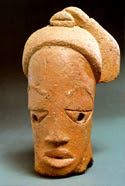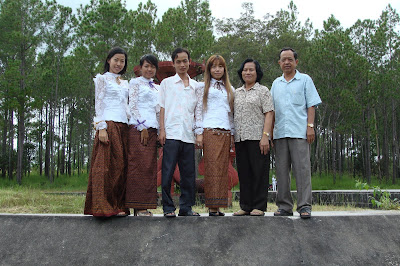Sweet Mother
Sweet mother I no go forget you
for the suffer wey you suffer for me.
Sweet mother I no go forget you
for the suffer wey you suffer for me.
When I dey cry, my mother go carry me--she go say,
my pikin [1] wetin you dey cry ye, ye,
stop stop, stop stop make you no cry again oh."
When I won sleep, my mother go pet me,
she go lie me well well for bed,
she cover me cloth, sing me to sleep,
"sleep sleep my pikin oh."
When I dey hungry, my mother go run up and down.
she go find me something when I go chop [2] oh.
Sweet mother I no go forget you for the suffer wey you suffer for me
When I dey sick, my mother go cry, cry, cry,
she go say instead when I go die make she die.
O, she go beg God,
"God help me, God help, my pikin oh."
If I no sleep, my mother no go sleep,
if I no chop, my mother no go chop, she no dey tire oh.
Sweet mother I no go forget you,
for the suffer wey you suffer for me.
You fit get another wife, you fit get another husband,
but you fit get another mother? No!
And if I forget you, therefore I forget my life and the air I breathe.
And then on to you men, forget, verily, forget your mother,
for if you forget your mother you've lost your life.
From song lyrics by Prince Nico Mbarga, 1976.
Prince Nico Mbarga, born of Nigerian and Cameroonian parents, recorded this highlife song, reportedly one of the biggest African music hits ever. "Tellingly, it is more widely recognized than the Nigerian national anthem," writes literary critic Chikwenye Ogunyemi (African Wo/man Palava, p. 287). "I wish that it were the national anthem, because of its ability to draw people together."
[1] pikin - child [2] chop - eat
Credits: Prince Nico Mbarga and Rocafil Jazz; record without title. Produced in Nigeria by Roger's All Stars 1976. ASAPLS 6, Decca France 278.159. Available on CD on Aki Special, Ro under Records (1987) CD 11545.
This CD is also available for sale at Amazon.com.
![]()
We have lost it,
the country we were born into.
We can now sing dirges of that commonwealth of yesterday --
we live in a country
that is no longer our own.
Our sacred trees have been cut down
to make armchairs for the rich and titled;
our totem eagle, that bird of great heights,
has been shot at by thoughtless guardians.
Our borders have been broken loose
to surfeit the exotic appetite for freedom,
our flag ripped off by uncaring hands.
Counting the obscenities from every mouth,
the stupor, the deep wounds in our souls,
you can tell that we live in a country
that is no longer our own.
Where are the tall trees
that shielded us from the sun's spears,
where are they now that hot winds
blow parching sands and bury us in dunes?
Where are those warriors
careful not to break taboos
who kept us from savage violations,
now that we face death?
Where are the healers
who offering themselves as ritual beasts
saved their neighbours from scourges?
We will expect in old age
to climb the mountain of prosperity
which we blew up in adolescence.
Our own country was a dream
so beautiful while it lasted,
and now we are exiles in a country that was once ours --
we were born into another country,
a world that has gone
with a big boom.
But we will not perish in this other country. We have lived through death to this day, we have deposed ourselves and depend on alms that come our way. We now know what it is to lose our home, what it is to lose a hospitable place for this exile. We expect the return of good days and wiser, will no longer let them pass from us. For now we live in a country
that is no longer our own.
Tanure Ojaide, 3-5 October, 1986
The Blood of Peace (London: Heinemann Books, 1991)
Tanure Ojaide, born in the Delta area of Nigeria, was Africa Regional Winner of the Commonwealth Poetry Prize in 1987. He has published numerous works of poetry and literary criticism.


Comments